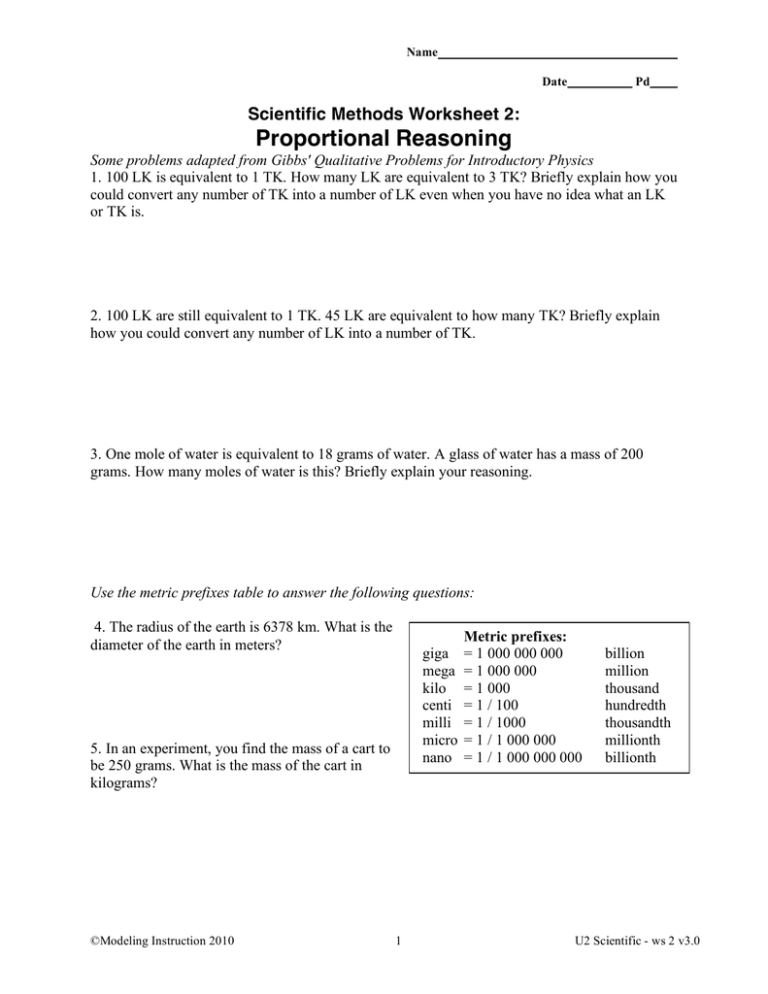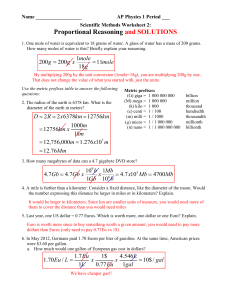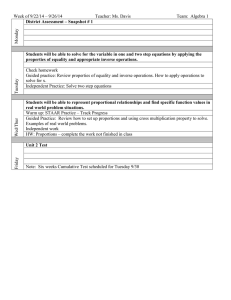Proportional Reasoning
advertisement

Name Date Pd Scientific Methods Worksheet 2: Proportional Reasoning Some problems adapted from Gibbs' Qualitative Problems for Introductory Physics 1. 100 LK is equivalent to 1 TK. How many LK are equivalent to 3 TK? Briefly explain how you could convert any number of TK into a number of LK even when you have no idea what an LK or TK is. 2. 100 LK are still equivalent to 1 TK. 45 LK are equivalent to how many TK? Briefly explain how you could convert any number of LK into a number of TK. 3. One mole of water is equivalent to 18 grams of water. A glass of water has a mass of 200 grams. How many moles of water is this? Briefly explain your reasoning. Use the metric prefixes table to answer the following questions: 4. The radius of the earth is 6378 km. What is the diameter of the earth in meters? giga mega kilo centi milli micro nano 5. In an experiment, you find the mass of a cart to be 250 grams. What is the mass of the cart in kilograms? ©Modeling Instruction 2010 1 Metric prefixes: = 1 000 000 000 = 1 000 000 = 1 000 = 1 / 100 = 1 / 1000 = 1 / 1 000 000 = 1 / 1 000 000 000 billion million thousand hundredth thousandth millionth billionth U2 Scientific - ws 2 v3.0 6. How many megabytes of data can a 4.7 gigabyte DVD store? 7. A mile is farther than a kilometer. Consider a fixed distance, like the diameter of the moon. Would the number expressing this distance be larger in miles or in kilometers? Explain. 8. One US dollar = 0.73 Euros (as of 8-07.) Which is worth more, one dollar or one Euro? How many dollars is one Euro? 9. In May 2007, Germans paid 1.41 Euros per liter of gasoline. At the same time, American prices were $2.90 per gallon. a. How much would one gallon of European gas cost in dollars? b. How much would one liter of American gasoline cost in Euros? (One US dollar = 0.73 Euros, 1 gallon = 4.546 liters) 10. A mile is equivalent to 1.6 km. When you are driving at 60 miles per hour, what is your speed in meters per second? Clearly show how you used proportions to arrive at a solution. ©Modeling Instruction 2010 2 U2 Scientific - ws 2 v3.0 11. Let y = a/(bx2). In each case listed below, describe how y will change. Explain each response. a. Double a, keeping b and x constant. b. Double b, keeping a and x constant. c. Double x, keeping a and b constant. 12. For each of the following mathematical relations, state what happens to the value of y when the value of x is halved. (k is a constant) a. y = kx b. y = k/x c. y = k/x2 ©Modeling Instruction 2010 3 U2 Scientific - ws 2 v3.0 13. When one variable is directly proportional to another, doubling one variable also doubles the other. If y and x are the variables and a and b are constants, circle the following relationships that are direct proportions. For those that are not direct proportions, explain what kind of proportion does exist between x and y. a. y = 3x b. y = ax + b c. y = x d. y = ax2 e. y = a/x f. y = ax g. y = 1/x h. y = a/x2 14. When one variable is inversely proportional to another, doubling one variable halves the other. If y and x are the variables, and a and b are constants, circle the following relationships that are inverse proportions. For those that are not inverse proportions, explain what kind of proportion does exist between x and y. a. y = ax b. y = a/x2 c. y = b/x d. y = 1/(x + b) e. y = ax + b f. y = 5/x g. y = x2 h. y = 1/x 15. The diagram shows a number of relationships between x and y. a. Which relationships are direct relations? b. Which relationships are indirect relations? c. Which relationships are direct proportions? Explain. d. Which relationships are inverse proportions? Explain. f e. Which relationships are linear? Explain. ©Modeling Instruction 2010 4 U2 Scientific - ws 2 v3.0

